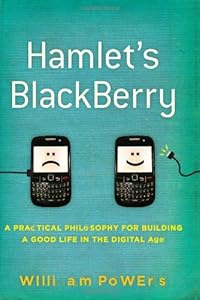 Cover via AmazonIn these days of wireless technology and social media - once you're on, it can be hard to get away from it. The constant urge to check your messages, your email, your tweets, your Facebook page.
Cover via AmazonIn these days of wireless technology and social media - once you're on, it can be hard to get away from it. The constant urge to check your messages, your email, your tweets, your Facebook page.The increasing occurrence of people being face-to-face but not really communicating - at least not with each other. Being in each other's presence but feeling the need to engage with one of their many gadgets at the same time.
How many times have you been out for a meal and seen people talking on their mobile phone or perhaps sitting in your local coffee shop, facing each other while on their laptops? Yes, I'll admit to tweeting when in meetings - but it's usually meeting related and for the purposes of sharing (no, really).
Are we really paying attention to each other or aware of what's going on around us, if we're constantly plugged in and switched on.
Social media and all this hyper-connectivity is a great distraction. It's all too easy to fritter away a whole day, engaging with one variety of technology or another and not actually doing anything productive or constructive.
There was much discussion on the programme about the size of their respective email Inboxes. Is this an indicator of 'busyness', importance or just a lack of organisation?
If you don't have a strategy for dealing with all those emails, they can quickly add up. I'm often helping people to tackle their mountains of email, creating order out of chaos - in fact it's come up twice in discussion today.
You need to know when to draw the line between the virtual/social media world and the real world right in front of you and what's going on all around you.
William Powers likened it to a sugar addiction - that rush, the buzz of excitement, the intensity of the experience. How do you feel when you're offline or away from technology for any length of time?
Jemima described how she spent four weeks offline and totally disconnected (see article link below).
When I took a sabbatical several years ago, I remember it took about six weeks to totally switch off from work. Yes, I'd been enjoying visiting new places and meeting new people since day one but it was only when I was in to week six that I realised I wasn't even thinking about work.
I wonder how different it would be now that we're all so much more connected. Back then social media didn't exist to the same degree and mobile phones were the main intrusion.
Less is more
I've been in family situations where everyone is on their laptop - having conversations with people who aren't in the room. Now if this family includes teenagers, the chances are they're on Facebook, Twitter, Myspace and 'chat' all at the same time!
- Implement technology free zones. One room in the house where technology (mobile phones and texting, laptops and social media are banned).
- Ban mobile phones from meal times. Yup, those teenagers at the dinner table, texting their mates that seem to be surgically attached to their mobile phones. Those of us who are old enough to remember a time before the mobile phone, may find it easier to do. Others can't imagine life without them.
- Know when to switch off. Deal with the 'crackberry' addiction and take time out when you're totally unconnected.
- Keep the weekends technology free as much as possible, especially if you spend most of your working day 'connected'.
Time to Think
 Image by DonkerDink via FlickrHarry mentioned the importance of finding time for thinking. It's certainly something I don't see people do enough and at a time when everyone is trying to do more and more, we actually need to do less and leave more time for doing nothing.
Image by DonkerDink via FlickrHarry mentioned the importance of finding time for thinking. It's certainly something I don't see people do enough and at a time when everyone is trying to do more and more, we actually need to do less and leave more time for doing nothing.While writing my book, I certainly felt the need to take frequent breaks to just switch off my brain from the computer and the screen in front of me and go and do something completely different to let the ideas mull over, or allow something to pop into the blank slate that I'd been staring at for the last few hours.
Switching off is just as important as being permanently connected. I have my best creative ideas when doing something else - usually a walk, being outside, gardening.
Make time in your life that doesn't involved always being connected.

1 comment:
This is so spot on Clare! I can relate to so much here and your comments and tips to avoid the pitfalls are appreciated
Post a Comment